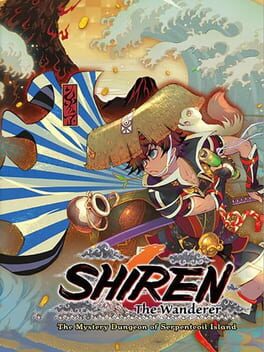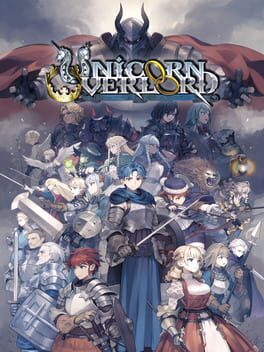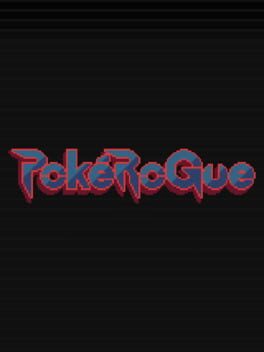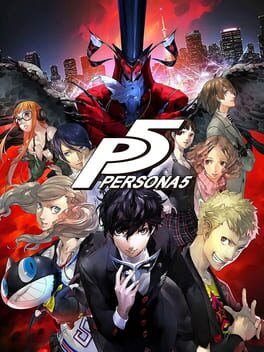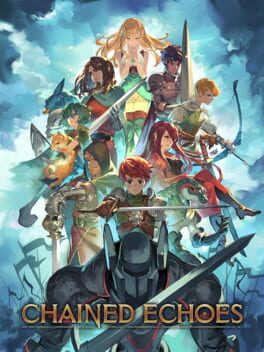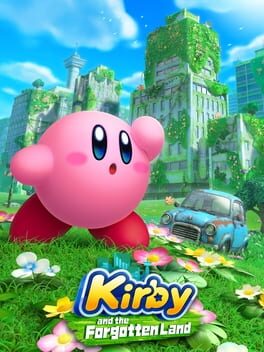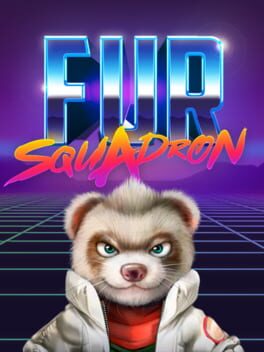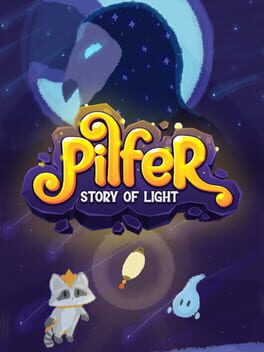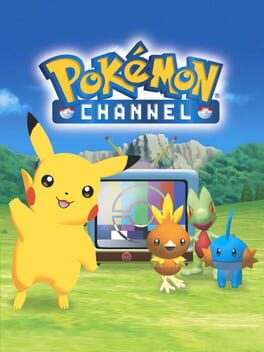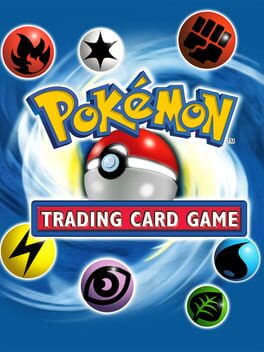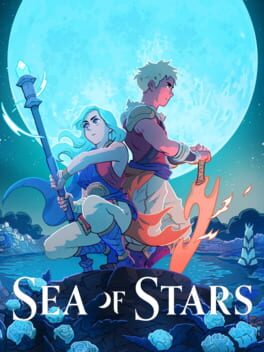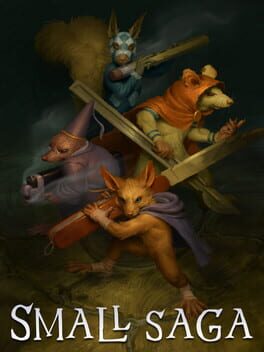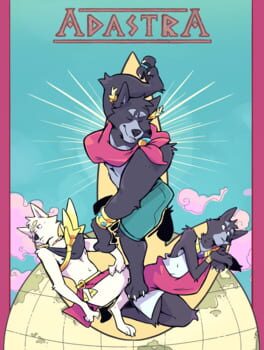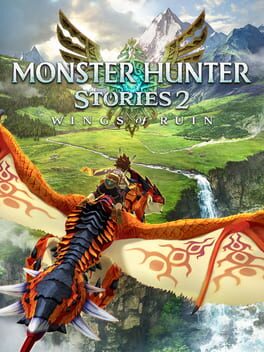lightheal
Gave this a try as a longtime PMD fan wishing for something to fill the void, but I just couldn't get into it. I expected as much, since I'm not a fan of rogue-likes, but still wanted to see where PMD originated from, and doing so made me appreciate both Shiren and PMD even more than I did before. While I probably won't continue my playthrough, I did have a fun time and there's a clear amount of charm and challenge that it has to offer.
No rating due to not playing enough to have a strong opinion.
No rating due to not playing enough to have a strong opinion.
2024
Haven't finished at the time of writing, but this is genuinely one of the better RPGs I've played of the past few years. I was on the fence for a long time, since the marketing was truly terrible, like TRULY horrid at telling you what this game even was. I thought it was like some mobile auto-battler gacha. But when I downloaded the demo, my God was I hooked for all 7 hours of my allotted time. I was BEGGING for more when I timed out.
The robust strategy gameplay feels practically unparalleled, Ogre Battle fans are FEASTING right now. There are so many ways to build your units and the characters within them, and I've ALWAYS been a huge fan of FF12's gambit system, fuck what the haters say. The game is highly repetitive, but the battles are so fun that I couldn't care less.
And I cannot understate how GOOD it feels to be able to roam around the world and choose your path through the game. I played on expert and consistently chose to take on missions that were a higher level than me just to see where it would take me and not only does the game allow you to do this, it gives you all the tools you need to do it so long as you have the skill to pull it off. This way, I was able to enter Bastorias to see the bestial units I was waiting SO LONG for before even entering Elheim. The satisfaction I got from that was unparalleled, I don't think I've ever seen an SRPG that was able to give me that level of strategic freedom.
I won't lie tho, despite how much I love this game, I have a hard time convincing myself to pick it up due to one major flaw: the story.
Unicorn Overlord's story is just a straight up nothing burger. I'm honestly convinced that writing just wasn't a core pillar of this game's design, because the quality of story writing and literally everything else is literally night and day. I wouldn't say it's a "bad" story by any means, but it is very much a skeleton of a story that says or does very little, which is a shame for someone who is huge on story in games.
To me, Unicorn Overlord seems much more like a game where the fun is ALL in the gameplay, which isn't a bad thing in itself. But it's hard for me to find a reason to come back when I just don't care about these characters or what is happening to this world. There are very little actually interesting cutscenes that break up the monotony of "Defeat the enemy commander!" missions that make up the entirety of the game, which can easily induce burn out if you don't have a good stomach for this type of repetition. The better cutscenes and dialogue you'll find are largely akin to a good S-rank support conversation in Fire Emblem, focusing more on character interaction than plot. Which is funny, since this game also has FE's support system with support scenes to boot.
Despite that, though, this is a great game. An excellent game, even. I seriously have nothing but praise for this game outside of its story, and wish for only more from Vanillaware.
The robust strategy gameplay feels practically unparalleled, Ogre Battle fans are FEASTING right now. There are so many ways to build your units and the characters within them, and I've ALWAYS been a huge fan of FF12's gambit system, fuck what the haters say. The game is highly repetitive, but the battles are so fun that I couldn't care less.
And I cannot understate how GOOD it feels to be able to roam around the world and choose your path through the game. I played on expert and consistently chose to take on missions that were a higher level than me just to see where it would take me and not only does the game allow you to do this, it gives you all the tools you need to do it so long as you have the skill to pull it off. This way, I was able to enter Bastorias to see the bestial units I was waiting SO LONG for before even entering Elheim. The satisfaction I got from that was unparalleled, I don't think I've ever seen an SRPG that was able to give me that level of strategic freedom.
I won't lie tho, despite how much I love this game, I have a hard time convincing myself to pick it up due to one major flaw: the story.
Unicorn Overlord's story is just a straight up nothing burger. I'm honestly convinced that writing just wasn't a core pillar of this game's design, because the quality of story writing and literally everything else is literally night and day. I wouldn't say it's a "bad" story by any means, but it is very much a skeleton of a story that says or does very little, which is a shame for someone who is huge on story in games.
To me, Unicorn Overlord seems much more like a game where the fun is ALL in the gameplay, which isn't a bad thing in itself. But it's hard for me to find a reason to come back when I just don't care about these characters or what is happening to this world. There are very little actually interesting cutscenes that break up the monotony of "Defeat the enemy commander!" missions that make up the entirety of the game, which can easily induce burn out if you don't have a good stomach for this type of repetition. The better cutscenes and dialogue you'll find are largely akin to a good S-rank support conversation in Fire Emblem, focusing more on character interaction than plot. Which is funny, since this game also has FE's support system with support scenes to boot.
Despite that, though, this is a great game. An excellent game, even. I seriously have nothing but praise for this game outside of its story, and wish for only more from Vanillaware.
2024
I haven't been this hooked into mainline Pokemon battling in ages, it's amazing how well back-to-back PvE battles go with rogue-like elements. Having restrictions on healing item use and set battle rules, and not starting every battle able to fully heal in-between, you actually have to engage with the mechanics of the series that the mainline games have stubbornly refused to offer for ages.
I've always LOATHED "hard" difficulty romhacks since they basically just pit you against competitive team builds on normal trainers while you have some mid-level, shoddy pkmn with no held items available. Pokerogue, however, takes advantage of the vanilla formula and makes you feel like you're on a journey with only slight deviations, like being allowed to have multiple held items or even stack held items for boosted effects.
I've never once felt like the game was overtly unfair, even with the amount of RNG involved in a run (well, except for a certain trainer's ace Pokemon, there's a reason Smogon banned it from ubers). Most of the time, I could've just made better decisions on what I caught and which items I chose. Hell, if you're lucky and find your favorite Pokemon in the wild, you can probably take it to the endgame with how the game lets you build your teams over the course of your journey.
Overall, better than the actual games IMO and is MUST play for anyone who wants a Pokemon game that respects its combat, but dislikes online competitive.
I've always LOATHED "hard" difficulty romhacks since they basically just pit you against competitive team builds on normal trainers while you have some mid-level, shoddy pkmn with no held items available. Pokerogue, however, takes advantage of the vanilla formula and makes you feel like you're on a journey with only slight deviations, like being allowed to have multiple held items or even stack held items for boosted effects.
I've never once felt like the game was overtly unfair, even with the amount of RNG involved in a run (well, except for a certain trainer's ace Pokemon, there's a reason Smogon banned it from ubers). Most of the time, I could've just made better decisions on what I caught and which items I chose. Hell, if you're lucky and find your favorite Pokemon in the wild, you can probably take it to the endgame with how the game lets you build your teams over the course of your journey.
Overall, better than the actual games IMO and is MUST play for anyone who wants a Pokemon game that respects its combat, but dislikes online competitive.
2016
The first time I'd ever been disappointed by a mainline Zelda game. While I wasn't a fan of Breath of the Wild (I'm not big on open worlds), it was so fresh and novel that I could respect and love what it did differently despite its slew of flaws. This time, however, ToTK came through the door expanding only on what makes open worlds so incredibly lackluster and tedious. This game peaks at the Great Sky Island and then never picks up again afterwards.
In many ways, ToTK feels like the definitive version of BoTW, it's the game that BoTW should have been, in my opinion. I actually had fun with the shrines here unlike its predecessor, and while there were still too many repeats, most were actually interesting and head scratching while remaining open-ended. The abilities Link has are usable almost everywhere, feeling less limited and useless than BoTW's for most parts of the game. The temples appear unique again! Though, practically, they fall through worse than BoTW's and feel like one shrine stretched far too wide.
But where it takes steps forward, it takes 10 steps back. The world feels incredibly empty, most of the time you're just walking around without actually exploring. The worst offender of this is the Depths, which are essentially just an emptier inverted mirror of the surface world. It's cool for the first 30 minutes, then it just becomes Minecraft's Nether back in 2010: dark, open, with nothing to find but the occasional large enemy. Once you've seen one corner of the Depths, you've seen the entire thing. And the saddest part is that if you do explore the Depths out of a sunk cost fallacy, you're rewarded with zonaite and......... DLC armor from the first game.
The sky islands and the Zonai are the biggest tragedy of this game, and I don't say that lightly. As I said earlier, the Great Sky Island is the best designed area in the game, and is also the only well designed sky island overall. There are only maybe 3 or 4 "types" of sky islands to find which all repeat themselves over and over. Similar to the depths, once you've found a few islands you've found them all. A shame given how unique and underutilized the idea of "sky islands" are to fantasy and video games in general, but also how beautiful and fun actually getting to these lands are.
I grieve for how the Zonai were treated here, truly grieving. Zelda has always had such wonderful and fantastical races, and the Zonai are no exception. They are magnificently designed, and have such an incredibly enchanting lore basis... and yet they are essentially nonexistent in their own game. It'd be interesting if you learned more about the Zonai, how they lived, how they influenced Hyrule, and key actors of their society as you play, similar to the Nomai in Outer Wilds (a game that I think does what ToTK wanted to do but vastly better), but that doesn't happen. The Zonai only serve as a way to give link new toys to play with and a new ability wheel to interact with the world.
Even Rauru, a fantastic character concept, is absent after patting you on the back and saying "have fun!" in beginning of the game. If the next Zelda games move on from the BoTW world as interviews imply, we may never see the Zonai again similar to the Minish or the Twili, which feels terrible given how they didnt have any time to shine. Despite that, I don't want to spend another minute in this world and want to get out of this Hyrule as soon as possible.
And do I even have to mention how awful the story is here? While the series has never had the prose and depths of a good novel, "Zelda has never had story" mfers show their ass that they've never played a Zelda game before BoTW because the old games at least try to support the feeling of adventure that the games offer, but through dialogue and cutscenes. Scenes like the desperate ending of Twilight Princess, the heartbreak of leaving Outset Island, these scenes couldn't happen without a story to give them meaning and ToTK offers a "story" but doesn't understand why the old games had one. There's nothing to feel watching the Zonai memories here, and the singular twist of the game is absolved and neutered by its ending. This game tries to have its cake and eat it too, and it feels so undeserved.
I could go on and on about how many things this game brings up, giving me hope for fun, and then drops the ball immediately. This game was just everything I didn't want in a Zelda game. Interviews with Aonuma released after ToTK's launch where he stated he didn't know how people could enjoy the old games anymore, and that makes me understand why ToTK feels so nothing as a game, the developing studio doesn't know what makes things fun.
When I asked friends of friends IRL, what they all loved about this game is that they could build things and blow up enemies. They all said they didn't care about the characters or world, and just loved that they had "freedom." None of them had played Zelda, and none of them wanted to know more about the series, they just wanted to play in the sandbox. And really, I think that's why this game had so much success: it didn't blow up because it's Zelda, it's great to most people because it's not Zelda, because it's shed so much of its identity for a common denominator, and that hurts as a longtime fan.
-------------------------------------------------------------------------
I teetered on the edge of being done with Zelda after BoTW, and now I'm fully convinced. I won't be returning to this series, and will be happier that way than being disappointed and edged for a good game for over a decade. There is so much wasted potential in ToTK, and Zelda as a series' corpse is ripe for indies to scavenge off, and I want to be there to see it. Now, if only anyone wanted to make a 3D Zelda or could even make a good 2D one, that's another topic on its own. But even if it's bad, I'd love to see people try.
In many ways, ToTK feels like the definitive version of BoTW, it's the game that BoTW should have been, in my opinion. I actually had fun with the shrines here unlike its predecessor, and while there were still too many repeats, most were actually interesting and head scratching while remaining open-ended. The abilities Link has are usable almost everywhere, feeling less limited and useless than BoTW's for most parts of the game. The temples appear unique again! Though, practically, they fall through worse than BoTW's and feel like one shrine stretched far too wide.
But where it takes steps forward, it takes 10 steps back. The world feels incredibly empty, most of the time you're just walking around without actually exploring. The worst offender of this is the Depths, which are essentially just an emptier inverted mirror of the surface world. It's cool for the first 30 minutes, then it just becomes Minecraft's Nether back in 2010: dark, open, with nothing to find but the occasional large enemy. Once you've seen one corner of the Depths, you've seen the entire thing. And the saddest part is that if you do explore the Depths out of a sunk cost fallacy, you're rewarded with zonaite and......... DLC armor from the first game.
The sky islands and the Zonai are the biggest tragedy of this game, and I don't say that lightly. As I said earlier, the Great Sky Island is the best designed area in the game, and is also the only well designed sky island overall. There are only maybe 3 or 4 "types" of sky islands to find which all repeat themselves over and over. Similar to the depths, once you've found a few islands you've found them all. A shame given how unique and underutilized the idea of "sky islands" are to fantasy and video games in general, but also how beautiful and fun actually getting to these lands are.
I grieve for how the Zonai were treated here, truly grieving. Zelda has always had such wonderful and fantastical races, and the Zonai are no exception. They are magnificently designed, and have such an incredibly enchanting lore basis... and yet they are essentially nonexistent in their own game. It'd be interesting if you learned more about the Zonai, how they lived, how they influenced Hyrule, and key actors of their society as you play, similar to the Nomai in Outer Wilds (a game that I think does what ToTK wanted to do but vastly better), but that doesn't happen. The Zonai only serve as a way to give link new toys to play with and a new ability wheel to interact with the world.
Even Rauru, a fantastic character concept, is absent after patting you on the back and saying "have fun!" in beginning of the game. If the next Zelda games move on from the BoTW world as interviews imply, we may never see the Zonai again similar to the Minish or the Twili, which feels terrible given how they didnt have any time to shine. Despite that, I don't want to spend another minute in this world and want to get out of this Hyrule as soon as possible.
And do I even have to mention how awful the story is here? While the series has never had the prose and depths of a good novel, "Zelda has never had story" mfers show their ass that they've never played a Zelda game before BoTW because the old games at least try to support the feeling of adventure that the games offer, but through dialogue and cutscenes. Scenes like the desperate ending of Twilight Princess, the heartbreak of leaving Outset Island, these scenes couldn't happen without a story to give them meaning and ToTK offers a "story" but doesn't understand why the old games had one. There's nothing to feel watching the Zonai memories here, and the singular twist of the game is absolved and neutered by its ending. This game tries to have its cake and eat it too, and it feels so undeserved.
I could go on and on about how many things this game brings up, giving me hope for fun, and then drops the ball immediately. This game was just everything I didn't want in a Zelda game. Interviews with Aonuma released after ToTK's launch where he stated he didn't know how people could enjoy the old games anymore, and that makes me understand why ToTK feels so nothing as a game, the developing studio doesn't know what makes things fun.
When I asked friends of friends IRL, what they all loved about this game is that they could build things and blow up enemies. They all said they didn't care about the characters or world, and just loved that they had "freedom." None of them had played Zelda, and none of them wanted to know more about the series, they just wanted to play in the sandbox. And really, I think that's why this game had so much success: it didn't blow up because it's Zelda, it's great to most people because it's not Zelda, because it's shed so much of its identity for a common denominator, and that hurts as a longtime fan.
-------------------------------------------------------------------------
I teetered on the edge of being done with Zelda after BoTW, and now I'm fully convinced. I won't be returning to this series, and will be happier that way than being disappointed and edged for a good game for over a decade. There is so much wasted potential in ToTK, and Zelda as a series' corpse is ripe for indies to scavenge off, and I want to be there to see it. Now, if only anyone wanted to make a 3D Zelda or could even make a good 2D one, that's another topic on its own. But even if it's bad, I'd love to see people try.
2022
2022
Inspired by Star Fox 64 and launches with flying colors. The dialogue between pilots is just as charming and memorable as the classics, and the game handles like a dream. I only wish it were a longer game, since it's basically just a 30 minute arcade shmup, but it seems a sequel has been greenlit and I'm very excited to get my hands on it!
This game OOZES nostalgia at every opportunity and is fully bathed in a charming warmth that puts a smile on my face whenever I play. The platforming is good, the environments are spectacular, and little Pilfer is the cutest thing I've laid eyes on. There is a lot of room for improvement, however, but with some more experimentation and refinement a future Pilfer game could be something amazing.
2003
I spent so much time in this game as a little kid. I didn't care that there was nothing to do or that it was, by definition, a "baby game", I would just put it on the TV and vibe with my best friend, Pikachu. I was an anxious kid, and I remember putting this and Animal Crossing on for comfort in the background, even if I wasn't playing. Man, what memories.
2023
Immaculate pixel-art and a nice soundtrack met with an aggressively mediocre and flat storyline filled with one-dimensional characters and uninteresting dialogue. Sea of Stars never really feels engaging beyond its strong visual presentation, banking on nostalgic atmosphere to appeal to its player base. I genuinely do not understand the level of praise this game receives, I've seen squirrels fighting outside that were more entertaining than this. People love to put this game and Chained Echoes on such a high pedestal when those two are just having the biggest mid-off of my life.
The combat is pretty satisfying on a surface level, but never develops much past the first few hours, which ends up feeling repetitive without a lot of skill variety or new mechanics to play with and adapt to. Party building is practically non-existent. There is some leeway to let you optimize your party with stat increase selection upon level ups and rudimentary equipment diversity, but overall every single character ends up being a glorified default attacker suited for whatever color element you need at the moment. Characters pretend like they're different from each other, but the game never asks you or gives you the ability to build strong magic attackers or bulky defensive units, or come up with niche party compositions, leading every fight to feel exactly the same.
The story and character writing was so poor that I couldn't even laugh at how bad it was. I felt like I was staring at blank walls the entire time. Nothing the characters did, said, or experienced ever mattered to themselves or their surroundings beyond superficiality. Every other line was a meta joke or quip about overused tropes and stereotypical JRPG writing, I felt like I was reading some Redditor's idea of an #epic D&D campaign. I swear I was only one step removed from reading a "Well, that just happened!" but at the same time I had to read a "Yeet" joke in 2023 with a straight face so, yeah. In spite of all this, Sea of Stars still has the audacity to bring out plot points of such grand scale that just don't feel earned due to its writing.
Frankly, I tried to give Sea of Stars more chances than it deserves. I so badly wanted another Chrono Trigger that I lowered my standards to convince myself I was having fun until I just couldn't take it anymore. I was kept bored the entire time I was playing, desperately continuing to see if it gets better... but it never did. I played up to right before the final boss and did every side quest I could out of curiosity but ultimately dropped this game because I simply wasn't enjoying my time.
Sea of Stars is a game that fundamentally does not understand its inspirations. I'm dangerously close to feeling like I was scammed, to be honest, given its marketing. "Aggressively mid" is probably the best way to describe this game. You're much better off playing the classics that inspired this game (Chrono Trigger, Mario RPG, Breath of Fire) and admiring the artwork from afar.
The combat is pretty satisfying on a surface level, but never develops much past the first few hours, which ends up feeling repetitive without a lot of skill variety or new mechanics to play with and adapt to. Party building is practically non-existent. There is some leeway to let you optimize your party with stat increase selection upon level ups and rudimentary equipment diversity, but overall every single character ends up being a glorified default attacker suited for whatever color element you need at the moment. Characters pretend like they're different from each other, but the game never asks you or gives you the ability to build strong magic attackers or bulky defensive units, or come up with niche party compositions, leading every fight to feel exactly the same.
The story and character writing was so poor that I couldn't even laugh at how bad it was. I felt like I was staring at blank walls the entire time. Nothing the characters did, said, or experienced ever mattered to themselves or their surroundings beyond superficiality. Every other line was a meta joke or quip about overused tropes and stereotypical JRPG writing, I felt like I was reading some Redditor's idea of an #epic D&D campaign. I swear I was only one step removed from reading a "Well, that just happened!" but at the same time I had to read a "Yeet" joke in 2023 with a straight face so, yeah. In spite of all this, Sea of Stars still has the audacity to bring out plot points of such grand scale that just don't feel earned due to its writing.
Frankly, I tried to give Sea of Stars more chances than it deserves. I so badly wanted another Chrono Trigger that I lowered my standards to convince myself I was having fun until I just couldn't take it anymore. I was kept bored the entire time I was playing, desperately continuing to see if it gets better... but it never did. I played up to right before the final boss and did every side quest I could out of curiosity but ultimately dropped this game because I simply wasn't enjoying my time.
Sea of Stars is a game that fundamentally does not understand its inspirations. I'm dangerously close to feeling like I was scammed, to be honest, given its marketing. "Aggressively mid" is probably the best way to describe this game. You're much better off playing the classics that inspired this game (Chrono Trigger, Mario RPG, Breath of Fire) and admiring the artwork from afar.
2023
Small Saga really surprised me! What I expected to be a small, silly game that I'd forget about ended up being a small, silly game filled with writing and soul that speaks to the heart. While not free of rough edges, it's the equivalent of an overlooked indie film at a local viewing with some awkward acting and choppy dialogue but brings out topics you've never seen before in media. I often felt like the writer themself was speaking to me directly through Small Saga, and decorated it in a nostalgic yet fresh atmosphere.
Queerness, Irish culture and identity, anti-fascism, Small Saga brings out the big guns about topics relevant in a modern age, fitting for what feels like a classic JRPG made in the 2020s. It's so refreshing and euphoric to see a story this bold and in celebration of what makes us human in the current reactionary climate rising worldwide.
Small Saga eschews much of the in-between of a typical RPG, however, railroading you from plot point to plot point. This can make the game feel quite rushed, but in my opinion this impacts the combat the most. With such small runtime, battles don't evolve much and make you feel like you're playing the beginning 2 hours of a typical Final Fantasy game or Chrono Trigger over the course of around 10 hours. This isn't exactly a downside as the battles are fun, but you won't exactly be getting any serious turn-based gameplay or any semblance of challenge.
Despite praising its bold themes, I feel that sometimes it can be a little too in your face or opaque about them. Very little is left open for interpretation which can be a bit unsatisfying for some players. Overall, Small Saga was a fantastic time and I will cherish and love these gay little rats (and Siobhan, my beloved!) for years to come!
Queerness, Irish culture and identity, anti-fascism, Small Saga brings out the big guns about topics relevant in a modern age, fitting for what feels like a classic JRPG made in the 2020s. It's so refreshing and euphoric to see a story this bold and in celebration of what makes us human in the current reactionary climate rising worldwide.
Small Saga eschews much of the in-between of a typical RPG, however, railroading you from plot point to plot point. This can make the game feel quite rushed, but in my opinion this impacts the combat the most. With such small runtime, battles don't evolve much and make you feel like you're playing the beginning 2 hours of a typical Final Fantasy game or Chrono Trigger over the course of around 10 hours. This isn't exactly a downside as the battles are fun, but you won't exactly be getting any serious turn-based gameplay or any semblance of challenge.
Despite praising its bold themes, I feel that sometimes it can be a little too in your face or opaque about them. Very little is left open for interpretation which can be a bit unsatisfying for some players. Overall, Small Saga was a fantastic time and I will cherish and love these gay little rats (and Siobhan, my beloved!) for years to come!
2018
Adastra is such a curious case. A project spearheaded by the writer of Echo, joined by Haps' wonderful art and Anthemics' utterly beautiful musical prowess, that somehow manages to fumble the ball over and over. Adastra is interesting in that it serves a fiery romance and a dramatic plot weaving between complex in-universe politics that are incredible as long as you don't look at it for more than 5 seconds.
I'm sure every furry has dreamed of a large, muscular, protective wolf man (or whatever species you fancy) whisking them away from their exhausting, monotonous life to shower them in unconditional love and care for your every need. Who wouldn't want that LMAO. It's all fun and games, however, until said wolf man is kidnapping you to make you his (sex) slave in an imperial colonial empire. I cannot understate how miserable this premise is to an Indigenous person playing this game, let alone a reasonable human being.
And interestingly enough, I find that this premise actually embodies the core of this visual novel's structural issues which are visible in every facet of its creation: Adastra wants wish fulfillment without actually thinking about the logistics required to create it.
You can easily look at every decision written and find that it was done for arousal first, coherence second. Adastra wants the reader to be surrounded by hot, half-naked furry men, so we're going to have a setting reminiscent of ancient Rome where men wear loincloths, communal nudity is common, and women's societal oppression allows them to be irrelevant in this story. To have this version of Rome, it'll be located in outer space where alien societies resemble human cultures. And to have that work, we'll say that every culture on Earth was actually the result of all these aliens colonizing humans at some point and teaching them how to be civilized. Yup, the aliens taught people how to make the pyramids; surely that's an interesting and not at all racially insensitive trope that's been historically used to diminish Black and Indigenous people's intelligence! The main character being designated as a slave (or, "pet," as it's referred to) is similarly just to indulge in a submissive vs dominant power fantasy.
I must give credit that the Roman-era setting, with all its societal misgivings and issues, makes for a fantastic drama that Howly makes excellent use of to keep you on your toes as you read. The political intrigue and tension throughout this story brought on by the issues in this world, issues that are far too great for any one person or group of people can even hope to stand a chance against, is downright enthralling. The interpersonal politics driving every character's actions are so powerful they would bring telenovelas on their knees. This is part of what made Echo so great and is honestly what makes Adastra memorable moreso than its romantic aspects. This sort of conflict between societal norms and personal desires is what Howly does best in my opinion. If Adastra weren't a romance, and instead solely a political drama around queer men in ancient Rome, then I think this story wouldn't have given me the distaste it did.
Now, to be honest, I think I could look past this story's many... many........... MANY misgivings if the romance was actually good. But it just isn't. I despise Amicus, and I'm not sure how I couldn't given how he's written! He's a selfish, entitled brat who can't think for himself, dodges any sort of responsibility, and is just a whiney baby that you're supposedly head over heels in love with because at the end of the day he's just a big dumb puppy :3. Your heckin' doggo is committing human rights violations and upholding the status quo, Johnathan.
From the start to the end, Amicus is downright unpleasant to be around at best and a literal manipulator at worst. The main character is less of a lover to Amicus and more a mother, having to care for his every need, comfort his every tantrum (and there are a lot of them), and clean up every one of his messes. In the story's biggest climax, it's the protagonist who takes the biggest fall for what is ultimately Amicus's problem and it's the protagonist who has to save himself while Amicus sits there and cries. Zero character development with zero redeeming traits. Genuinely what am I supposed to like about this guy. If Amicus broke into my home in the dead of night I'd have beat him with hammers I can tell you that much.
Shoutout to Neferu, though, he's a real one.
Now, with all that said, i think the background behind Adastra's development offers some explanation for why it is the way it is. I remember being a Patreon supporter back in 2018 and reading that the writer was experiencing difficulties and burnout with writing. Adastra was that oil to the rusting door, a place to let loose and get the rhythm going. In that regard, I'm thankful that Adastra had to take the bullet as Echo just got better and better from this point on. It's unfortunate, then, that Adastra became such a wild hit, dwarfing Echo in attention and becoming what Echo Project would be known for to most people for the next several years. The precedents set by Adastra's success would go on to irreparably change the furry visual novel scene, for better or for worse, and open up the wider furry community into its second big visual novel boom.
I'm sure every furry has dreamed of a large, muscular, protective wolf man (or whatever species you fancy) whisking them away from their exhausting, monotonous life to shower them in unconditional love and care for your every need. Who wouldn't want that LMAO. It's all fun and games, however, until said wolf man is kidnapping you to make you his (sex) slave in an imperial colonial empire. I cannot understate how miserable this premise is to an Indigenous person playing this game, let alone a reasonable human being.
And interestingly enough, I find that this premise actually embodies the core of this visual novel's structural issues which are visible in every facet of its creation: Adastra wants wish fulfillment without actually thinking about the logistics required to create it.
You can easily look at every decision written and find that it was done for arousal first, coherence second. Adastra wants the reader to be surrounded by hot, half-naked furry men, so we're going to have a setting reminiscent of ancient Rome where men wear loincloths, communal nudity is common, and women's societal oppression allows them to be irrelevant in this story. To have this version of Rome, it'll be located in outer space where alien societies resemble human cultures. And to have that work, we'll say that every culture on Earth was actually the result of all these aliens colonizing humans at some point and teaching them how to be civilized. Yup, the aliens taught people how to make the pyramids; surely that's an interesting and not at all racially insensitive trope that's been historically used to diminish Black and Indigenous people's intelligence! The main character being designated as a slave (or, "pet," as it's referred to) is similarly just to indulge in a submissive vs dominant power fantasy.
I must give credit that the Roman-era setting, with all its societal misgivings and issues, makes for a fantastic drama that Howly makes excellent use of to keep you on your toes as you read. The political intrigue and tension throughout this story brought on by the issues in this world, issues that are far too great for any one person or group of people can even hope to stand a chance against, is downright enthralling. The interpersonal politics driving every character's actions are so powerful they would bring telenovelas on their knees. This is part of what made Echo so great and is honestly what makes Adastra memorable moreso than its romantic aspects. This sort of conflict between societal norms and personal desires is what Howly does best in my opinion. If Adastra weren't a romance, and instead solely a political drama around queer men in ancient Rome, then I think this story wouldn't have given me the distaste it did.
Now, to be honest, I think I could look past this story's many... many........... MANY misgivings if the romance was actually good. But it just isn't. I despise Amicus, and I'm not sure how I couldn't given how he's written! He's a selfish, entitled brat who can't think for himself, dodges any sort of responsibility, and is just a whiney baby that you're supposedly head over heels in love with because at the end of the day he's just a big dumb puppy :3. Your heckin' doggo is committing human rights violations and upholding the status quo, Johnathan.
From the start to the end, Amicus is downright unpleasant to be around at best and a literal manipulator at worst. The main character is less of a lover to Amicus and more a mother, having to care for his every need, comfort his every tantrum (and there are a lot of them), and clean up every one of his messes. In the story's biggest climax, it's the protagonist who takes the biggest fall for what is ultimately Amicus's problem and it's the protagonist who has to save himself while Amicus sits there and cries. Zero character development with zero redeeming traits. Genuinely what am I supposed to like about this guy. If Amicus broke into my home in the dead of night I'd have beat him with hammers I can tell you that much.
Shoutout to Neferu, though, he's a real one.
Now, with all that said, i think the background behind Adastra's development offers some explanation for why it is the way it is. I remember being a Patreon supporter back in 2018 and reading that the writer was experiencing difficulties and burnout with writing. Adastra was that oil to the rusting door, a place to let loose and get the rhythm going. In that regard, I'm thankful that Adastra had to take the bullet as Echo just got better and better from this point on. It's unfortunate, then, that Adastra became such a wild hit, dwarfing Echo in attention and becoming what Echo Project would be known for to most people for the next several years. The precedents set by Adastra's success would go on to irreparably change the furry visual novel scene, for better or for worse, and open up the wider furry community into its second big visual novel boom.
Stories 2 is just downright gorgeous, the euphoria I feel riding my very own arzuros and tigrex through vast fields is actually unmatched. All the new weapon types added some MUCH needed hunter variety, and made mid-battle weapon swapping actually feel good. At the same time, though, Stories 2 lacked....... something that made Stories 1 feel so good, and I don't think I can pin it down on some glaringly obvious weakness. To be honest, I was kinda bored of this game for most of the time I was playing, and wasn't really sure what this game was offering me to come back to.
Den grinding is still as repetitive and boring as ever, and the monster ranking system which monsters scale stats around railroad you into using only small selections of monsters throughout the game, which badly hurts party diversity and you kinda just can't take one or two faves from the beginning to end because they get so badly outclassed in just the next area.
As beautiful as this game is, the actual landscapes to explore are so barren of anything meaningful that the game just becomes a walking/flying simulator with little reward, it's sad. Stories 2 is a pretty alright game that genuinely has endless potential to improve. It does have the best hairstyle options in Monster Hunter since the mainline 3DS games, so there's that at least!
Den grinding is still as repetitive and boring as ever, and the monster ranking system which monsters scale stats around railroad you into using only small selections of monsters throughout the game, which badly hurts party diversity and you kinda just can't take one or two faves from the beginning to end because they get so badly outclassed in just the next area.
As beautiful as this game is, the actual landscapes to explore are so barren of anything meaningful that the game just becomes a walking/flying simulator with little reward, it's sad. Stories 2 is a pretty alright game that genuinely has endless potential to improve. It does have the best hairstyle options in Monster Hunter since the mainline 3DS games, so there's that at least!
